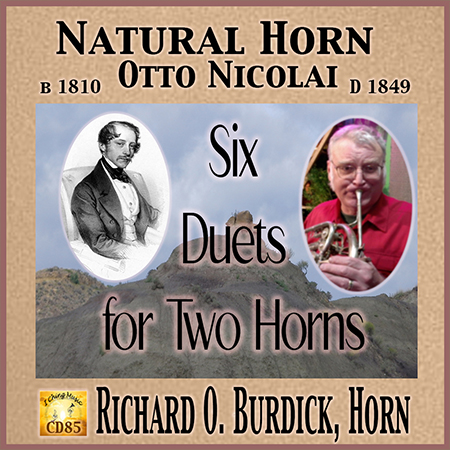
 Released: soon in January 2024
Released: soon in January 2024
Performed by:
Richard Burdick's multi-track natural horn ensemble
![]()
Carl Otto Ehrenfried Nicolai (9 June 1810 – 11 May 1849) was a German composer, conductor, and one of the founders of the Vienna Philharmonic. Nicolai is best known for his operatic version of Shakespeare's comedy The Merry Wives of Windsor as Die lustigen Weiber von Windsor. In addition to five operas, Nicolai composed lieder, works for orchestra, chorus, ensemble, and solo instruments.
Nicolai, a child prodigy, was born in Königsberg, Prussia. He received his first musical education from his father, Carl Ernst Daniel Nicolai, who was also a composer and musical director. During his childhood his parents divorced, and while still a youth, early in June 1826, Nicolai ran away from his parents' "loveless" home, taking refuge inStargard with a senior legal official called August Adler who treated the musical prodigy like a son and, when Nicolai was seventeen, sent him to Berlin to study with C. F. Zelter.
After initial successes in Germany, including his first symphony (1831) and public concerts, he became musician to the Prussian embassy in Rome. When Verdi declined the libretto of Il proscritto by the proprietors of La Scala in Milan, it was offered instead to Nicolai. Later, Nicolai refused a libretto by the same author, and it went to Verdi, whose NAbucco was his first early success. All of Nicolai's operas were originally written in Italian, the sole exception being his last and best known opera, The Merry Wives of Windsor, written in German. At one time he was even more popular in Italy than Verdi.
During the early 1840s, Nicolai established himself as a major figure in the concert life of Vienna. In 1844 he was offered the position, vacated by Felix Mendelssohn, of Kapellmeister at the Berlin Cathedral; but he did not reestablish himself in Berlin until the last year of his life.
On 11 May 1849, two months after the premiere of The Merry Wives of Windsor, and only two days after his appointment as Hofkapellmeister at the Berlin Staatsoper, he collapsed and died from a stroke. On the same day of his death, he was elected a member of the Royal Prussian Academy of Arts.
![]()

Otto Nicolai Six Duets |
time | ||
DUET 1: Sonata in F major |
isrc code |
time | |
| 1 | 1: Allegro |
QM4TX2427924 |
7:24 |
| 2 | 2: Adagio |
QM4TX2427925 |
5:38 |
| 3 | 3: Rondo: Allegretto |
QM4TX2427926 |
4:34 |
DUET 2: Sonata in D minor |
isrc code |
time | |
| 4 | 1: Allegro |
QM4TX2427927 |
6:02 |
| 5 | 2: Andante con Variazioni |
QM4TX2427928 |
4:52 |
| 6 | 3: Rondo: Allegro |
QM4TX2427929 |
4:44 |
DUET 3: Sonata in F |
isrc code |
time | |
| 10 | 1: Allegro |
QM4TX2427930 |
5:58 |
| 11 | 2: Adagio |
QM4TX2427931 |
6:52 |
| 12 | 3: Polonaise |
QM4TX2427932 |
3:16 |
DUET 4: Sonata in A minor |
isrc code |
time | |
| 10 | 1: Allegro |
QM4TX2427933 |
7:26 |
| 11 | 2: Andante |
QM4TX2427934 |
3:46 |
| 12 | 12: Allegro agitato |
QM4TX2427935 |
5:08 |
DUET 5: Sonata in C major |
isrc code |
time | |
| 13 | 1: Allegro |
QM4TX2427936 |
7:22 |
| 14 | 2: Adagio |
QM4TX2427937 |
3:08 |
| 15 | 3: Rondo: Allegro |
QM4TX2427938 |
4:04 |
DUET 6: Sonata in F |
isrc code |
||
| 16 | 1: Allegro FEATURED TRACK |
QM4TX2427939 |
9:34 |
| 17 | 2: Adagio |
QM4TX2427940 |
3:36 |
| 18 | 3: Rondo: Allegretto |
QM4TX2427941 |
5:10 |
total time: |
![]()
![]()
ISRC
Would you like to comment on this work?We would appreciate comments,
|
|---|
Bar code: 728488426463